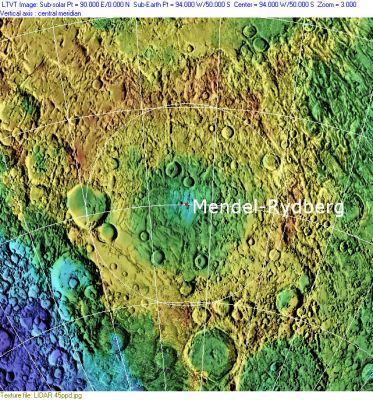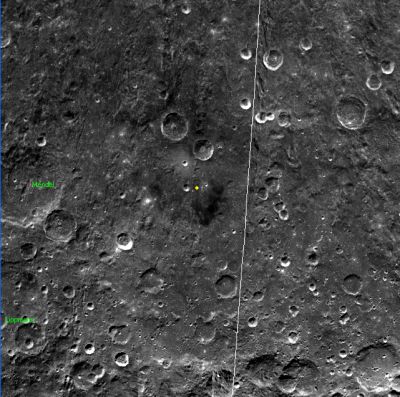Mendel-Rydberg Basin
Contents
Mendel-Rydberg Basin
(unofficial name)
| Lat: 50°S, Long:94°W , Main ring diam: 630 km, Depth: 5.24 or 5.56 km, Rukl: (farside) | |
Right: Annotated Clementine view of region using the LTVT software.
Images
LPOD Photo Gallery Lunar Orbiter Images
Maps
(LAC zone 135B1) USGS Digital Atlas PDF
Basin Classification
(description of terms and most numeric basin data from Wood, C.A. (2004) Impact Basin Database)
| Certainty of Existence |
USGS Age |
Wilhelms Age Group |
Ring Diameters |
Mare Thickness |
Mascon |
| Definite |
Nectarian |
10 |
600 m |
Yes, 31 mG gravity anomaly |
Description
Additional Information
- Mare area of 2,900 km^2 according to measurements by Jim Whitford-Stark.
- Rim height: 2.14 km
- Discovered by Hartmann and Kuiper (1962)
Nomenclature
- Basins filled with named maria are named for the mare, and basins that were previously recognized as craters still bear the crater name. Basins located between craters have the names of two opposite craters with a hyphen in between. The naming of this basin seems to be a bit of an anomaly: Mendel is on the outer rim, Rydberg is not. A better name might have been Mendel-Baade Basin or, perhaps, the Parvum Basin, since the central mare was apparently once known as Mare Parvum? - JimMosher
- Don E. Wilhelms seems to have been the source of the name Mendel-Rydberg Basin (see pages 86 and 387 (footnote n.13) in Don's book To A Rocky Moon, a Geologist's History of Lunar Exploration). Before Don's Mendel-Rydberg Basin, it was called the SouthEast Basin by William K. Hartmann and Gerard P. Kuiper.- DannyCaes May 8, 2014
- The low-albedo region at the centre of the Mendel-Rydberg Basin (near crater Andersson) might have called Palus Solitatis. Unfortunately, this name was not approved by the IAU. See page Luna Incognita.
LPOD Articles
Bibliography

